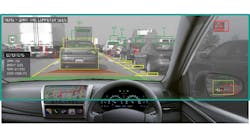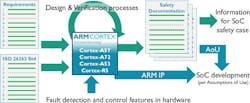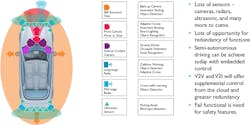Safety Document Package Targets ADAS
ARM has noted that Advanced Driver Assistance Systems (ADAS) equipped vehicles in 2024 will require at least 100x more compute performance compared to 2016 models. They will also be highly connected including links to the cloud and possibly adjacent vehicles and landmarks. This performance will require ever-increasing multicore SoCs that must meet safety and security requirements.
According to Justin Moon, global technologist for business development at QNX Software Systems, “Systems in the vehicle are increasingly connected, and while this connectivity presents many opportunities, it can also pose security threats and vulnerabilities.The software powering these systems can do a great deal to help ensure the validity and integrity of the system–known as establishing a ‘chain of trust.’ The chain of trust helps ensure that the automotive software is correct, has appropriate access to features, and hasn’t been compromised by tampering Establishing a chain of trust demands a comprehensive, multidisciplinary approach to system design. It starts with the architecture of the underlying OS and hardware, and extends up to the applications and services.”
The paper trail is critical to getting various security and safety approvals or certifications. The process needs to start at the lowest level, which is why ARM’s latest announcement is important. ARM is delivering a safety documents package for its Cortex-A processors starting with the Cortex-A57, Cortex-A72, and Cortex-A53 processors (Fig. 1).
Developers will need to build on ARM’s safety information, but they will not be starting from the ground up. This is key because of the sophistication of the SoC designs and the plethora of sensors being added to vehicles (Fig. 2). The added sensor arrays can provide redundancy and improve safety in semi-autonomous driving vehicles.
Vehicle-to-vehicle (V2V) and vehicle-to-infrastructure (V2I) can provide additional redundancy, services, and information, but this connectivity needs to be secure. Remotely compromising a vehicle must be prevented and this root of trust starts in the silicon.
ARM had already announced this type of safety documentation and support for its Cortex-R5 earlier this year. The Cortex-R5 processor is often tasked with real-time automotive chores. ARM says it will expand its safety support for the Cortex-M series later in 2015.


